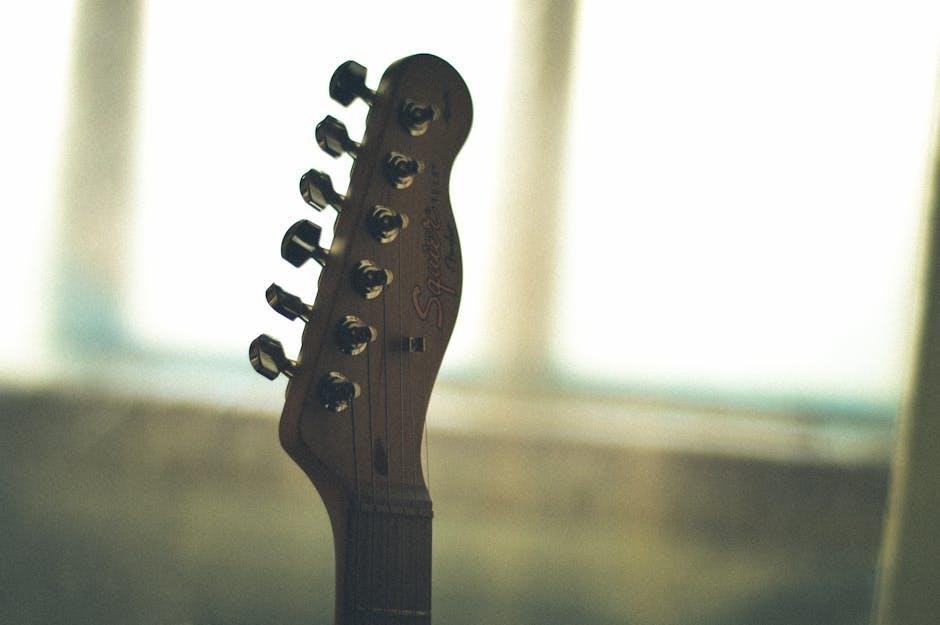Guitar strings are essential for producing sound and tone‚ with their material‚ gauge‚ and type significantly impacting playability and overall musical expression. Understanding their role helps musicians make informed choices to enhance their sound quality and performance.
1.1 Importance of Guitar Strings in Sound Quality
Guitar strings are the voice of your instrument‚ directly influencing tone‚ resonance‚ and playability. Their material‚ gauge‚ and winding significantly impact sound clarity and richness. Lighter strings offer a brighter‚ delicate tone‚ while heavier strings produce a fuller‚ louder sound. The right strings enhance sustain and intonation‚ ensuring your guitar sounds its best. Poor-quality or worn-out strings can dull your sound and affect performance. Thus‚ selecting the appropriate strings is crucial for achieving the desired musical expression and maintaining optimal sound quality.
1.2 Brief History of Guitar Strings
Guitar strings have evolved significantly over centuries‚ from gut to modern materials. Early strings were made of animal intestines‚ transitioning to steel in the 20th century. Nylon strings emerged for classical guitars‚ while electric guitars popularized steel-wound strings. Advances in materials like titanium and coated strings have improved tone and durability. This historical progression reflects the adaptation of strings to musical demands‚ shaping the sound of various guitar types and playing styles across different eras. Each development aimed to enhance playability‚ tone‚ and longevity.
1.3 Why Choosing the Right Strings Matters
Choosing the right guitar strings is crucial for achieving optimal tone‚ playability‚ and durability. Strings directly impact sound quality‚ with materials like steel‚ bronze‚ or nylon offering distinct tones. Gauge affects playability‚ influencing finger strength and string bending. Proper selection ensures compatibility with your guitar type and playing style‚ preventing issues like string buzzing or tuning instability. Regular string changes maintain clarity and intonation‚ while coated strings extend lifespan. Selecting the right strings enhances your musical expression and overall playing experience‚ making it a vital part of guitar ownership.

Types of Guitar Strings
Guitar strings come in various types‚ including acoustic‚ electric‚ classical‚ and extended-range options‚ each designed to suit specific playing styles and musical genres‚ ensuring versatility for all players.
2.1 Acoustic Guitar Strings
Acoustic guitar strings are crucial for producing a rich‚ resonant sound. They are typically made of bronze or phosphor bronze materials‚ which enhance tonal warmth and clarity. Lighter gauges (e.g.‚ 0.010-0.047) are ideal for beginners‚ offering easier playability‚ while heavier gauges (0.012-0.053) provide a fuller tone and louder projection. Proper string selection depends on playing style and desired sound‚ with coated options available for extended durability and reduced finger noise. Regular changes ensure optimal performance and maintain the guitar’s voice.
2.2 Electric Guitar Strings
Electric guitar strings are designed to deliver crisp‚ clear tones and sustain. Typically made of nickel‚ stainless steel‚ or cobalt‚ they come in various gauges‚ with lighter sets (e.g.‚ 0.009-0.042) offering easier playability and heavier sets (0.011-0.048) providing more resonance. Coated strings reduce finger noise and extend lifespan. Players often choose strings based on genre‚ with lighter gauges suiting rapid techniques and heavier gauges enhancing low-end punch. Brands like Ernie Ball and D’Addario are popular for their balanced tone and durability.
2.3 Classical Guitar Strings
Classical guitar strings are crafted for nylon-string guitars‚ producing warm‚ mellow tones. They typically feature three nylon treble strings and three wound bass strings for clarity and projection. Lighter gauges (e.g.‚ hard tension) suit fingerstyle techniques‚ while heavier gauges offer more volume. Brands like D’Addario and Savarez provide high-quality options‚ ensuring optimal playability and resonance. These strings are ideal for classical‚ flamenco‚ and acoustic styles‚ emphasizing intricate fingerwork and expressive dynamics.
2.4 12-String Guitar Strings
12-string guitar strings create a rich‚ jangly sound by pairing each note with an octave or unison string. Often used in classic rock and folk‚ they add depth to chords and melodies. Acoustic 12-strings are more common‚ but electric versions exist. Strings are typically lighter to accommodate higher tension‚ and tuning can be more complex. This setup is favored for its unique resonance and layered tone‚ making it a staple in songs like “Hotel California” and “Stairway to Heaven.”
2.5 Extended Range Guitar Strings (7- and 8-String)
Extended range guitars‚ such as 7- and 8-strings‚ are popular in modern metal music for their deep‚ aggressive tones. These guitars add lower-pitched strings beyond the standard E‚ allowing for heavier riffs and complex compositions. The additional strings enable players to explore lower tunings and expand their musical possibilities. However‚ they require a stronger playing technique due to increased string tension and a wider neck. Proper setup and string choice are crucial for optimal playability and sound quality in these unique instruments.

Materials Used for Guitar Strings
Guitar strings are made from various materials‚ including steel‚ bronze‚ nylon‚ and nickel‚ each offering unique tonal qualities and playing experiences. Material choice significantly impacts sound‚ sustain‚ and feel.
3.1 Steel Strings
Steel strings are widely used for their bright‚ crisp tone and durability. They are commonly found on electric guitars and offer excellent sustain. Thinner steel strings are easier to play‚ while heavier gauges provide a fuller sound. However‚ they can be harder on the fingers and may cause more fret wear. Steel strings are versatile‚ making them a popular choice for various musical genres. Proper care ensures they maintain their tone and longevity.
3;2 Bronze Strings
Bronze strings are renowned for their warm‚ rich tone‚ making them a popular choice for acoustic guitars. They are available in various gauges‚ with heavier strings producing a louder and fuller sound‚ while lighter gauges offer a more delicate sound and feel. This versatility makes them suitable for a wide range of musical styles. Proper care‚ including regular cleaning and storage‚ is essential to maintain their tone and longevity. By choosing the right gauge and maintaining them well‚ musicians can enhance their sound quality and performance.
3.3 Nylon Strings
Nylon strings are primarily used for classical and flamenco guitars‚ offering a smooth‚ warm‚ and mellow tone. They are easier on the fingers compared to steel strings‚ making them ideal for beginners or those playing delicate styles. Nylon strings provide a softer sound and are less durable than steel strings‚ requiring more frequent changes. Their unique texture and tone make them a staple for classical music‚ while their gentle feel suits players prioritizing comfort and expressive playability.
3.4 Nickel-Wound Strings
Nickel-wound strings blend a smooth‚ warm tone with durability‚ making them a popular choice for both electric and acoustic guitars. The nickel winding adds a vintage feel and reduces finger noise‚ offering a balanced sound with clear highs and rich lows. These strings are versatile‚ suitable for various genres‚ from jazz to rock. They provide consistent performance and are favored by players seeking a traditional tone with long-lasting quality. Nickel-wound strings are a reliable option for musicians aiming for a classic sound and smooth playability.
3.5 Titanium Strings
Titanium strings are known for their bright‚ crisp tone and excellent sustain‚ offering clarity and definition. They provide a smooth playing feel and are highly durable‚ resisting corrosion. While more expensive‚ their unique sound and longevity make them a worthwhile investment for players seeking a modern‚ articulate sound with lasting performance.

String Gauges
String gauges significantly impact playability and tone‚ with heavier strings offering fuller sound and louder resonance‚ while lighter strings provide easier playability and a delicate tone.
4.1 Light Gauge Strings
Light gauge strings are ideal for beginners and players seeking easier playability. They offer a delicate‚ bright sound and are excellent for bending notes. However‚ they may lack the fullness and volume of heavier gauges. Suitable for acoustic and electric guitars‚ light strings are perfect for fingerstyle and lead playing. They require less hand strength‚ making them a great choice for those who play for extended periods or prefer a softer feel. Light gauges are also less likely to cause finger fatigue.
4.2 Medium Gauge Strings
Medium gauge strings strike a perfect balance between playability and tone‚ making them a popular choice for many players. They provide a clear‚ full sound while remaining comfortable to play. With a moderate tension‚ they are versatile for both acoustic and electric guitars. Medium gauges are ideal for players who switch between styles‚ offering enough brightness for lead work and sufficient depth for rhythm playing. They are a great all-purpose option‚ suitable for various musical genres and playing techniques‚ making them a staple in many guitarists’ arsenals.
4.3 Heavy Gauge Strings
Heavy gauge strings are designed for players seeking a robust‚ full-bodied sound with increased sustain. They deliver a powerful tone‚ making them ideal for genres like metal‚ hard rock‚ and jazz. With higher tension‚ they are durable and resistant to wear‚ offering consistent performance. While they require more finger strength‚ heavy gauges are perfect for drop tunings and aggressive playing styles. They provide a strong‚ resonant sound that stands out in heavy music‚ making them a favorite among experienced players who need a bold and impactful tone.
4.4 Custom Gauge Sets
Custom gauge sets allow players to tailor their string selection to specific musical needs. By mixing gauges‚ musicians can achieve a balanced tone and optimal playability. These sets are ideal for those who experiment with unique tunings or require specific string tensions for their style. Players can combine heavier strings for lower notes and lighter ones for higher notes‚ ensuring clarity and comfort. Custom gauges offer flexibility‚ catering to individual preferences and techniques‚ making them a popular choice among advanced players seeking precision and versatility in their sound.

Winding Types
Winding types determine a string’s feel and tone. Roundwound strings offer a bright‚ robust sound‚ while flatwound strings provide a smooth‚ mellow tone. Halfwound strings balance both characteristics.
5.1 Roundwound Strings
Roundwound strings are the most common type‚ known for their bright‚ full tone and sustain. They feature a steel core wrapped with a nickel alloy wire‚ creating a smooth‚ rounded surface. These strings are versatile and suit various musical genres‚ from rock to jazz. While they provide excellent clarity and projection‚ some players find them slightly rough on the fingers. Roundwound strings are ideal for both acoustic and electric guitars‚ offering a balanced sound that enhances musical expression across different playing styles.
5.2 Flatwound Strings
Flatwound strings are known for their smooth‚ flat surface‚ which reduces finger noise and provides a mellow‚ warm tone. They are ideal for jazz‚ blues‚ and slide guitar‚ offering a vintage sound. The flat winding minimizes string squeak‚ making them perfect for recording and smooth playing styles. While they are less common than roundwound strings‚ flatwounds are favored by players seeking a softer feel and a rich‚ resonant sound that emphasizes lower frequencies‚ enhancing musical depth and tonal clarity.
5.3 Halfwound Strings
Halfwound strings blend the smooth feel of flatwounds with the brightness of roundwounds‚ offering a balanced tone and moderate durability; They are less common but preferred for genres like jazz and fusion‚ where both articulation and warmth are desired. The unique winding process reduces finger noise compared to roundwounds while maintaining some brightness‚ making them suitable for players seeking a middle ground between the two. This hybrid design allows for dynamic playability and a versatile sound‚ appealing to those who want the best of both worlds in their music.
Coated vs. Uncoated Strings
Coated strings offer durability and reduced finger noise‚ while uncoated strings provide a brighter tone and smoother feel. Choose based on sound preference and playing style.
6.1 Coated Strings
Coated guitar strings feature a thin protective layer that reduces corrosion and finger noise. This coating enhances durability‚ making them last longer and resistant to oil and dirt. They are ideal for players seeking a smoother playing experience and consistent tone over time. However‚ coated strings can slightly mute the brightness of the sound compared to uncoated ones. They are a popular choice for musicians who prioritize string longevity and reduced maintenance.
6.2 Uncoated Strings
Uncoated strings offer a bright‚ crisp tone and a smooth playing feel‚ making them a favorite among musicians who value natural resonance. Without the protective layer‚ they provide excellent sustain and clarity. However‚ they are more prone to corrosion and wear‚ requiring frequent changes to maintain optimal sound quality. Uncoated strings are ideal for players seeking a vibrant‚ dynamic sound and are widely used across various musical genres for their authentic acoustic and electric guitar tones.
Core Types
Guitar strings feature either hex core or round core constructions‚ each offering unique tonal and playing characteristics. Hex cores provide stability and consistency‚ while round cores deliver a smoother feel and enhanced sustain.
7.1 Hex Core Strings
Hex core strings are the most common type‚ known for their stability and consistency. The hexagonal shape provides a solid foundation for the windings‚ ensuring minimal movement and a clear‚ focused tone. These strings are durable and resistant to changes in temperature and humidity‚ making them a reliable choice for guitarists. The hex core’s rigid structure enhances sustain and reduces unwanted overtones‚ delivering a balanced sound that suits a wide range of playing styles and musical genres. They are ideal for both electric and acoustic guitars‚ offering versatility and dependable performance.
7.2 Round Core Strings
Round core strings are known for their smooth‚ warm tone and greater flexibility. Unlike hex cores‚ the round core allows the windings to vibrate more freely‚ producing a richer‚ more resonant sound. These strings are often preferred by jazz and fingerstyle players for their smooth playing feel and expressive qualities. The round core design also enhances sustain‚ making them ideal for players seeking a vintage or classic tone. They are less common than hex cores but offer a unique sonic experience for those seeking warmth and depth in their sound.

Popular Brands
Prominent brands like Elixir‚ Ernie Ball‚ D’Addario‚ and Martin are celebrated for their high-quality strings‚ offering durability‚ tone consistency‚ and versatility for various playing styles and musical genres.
8.1 Elixir Strings
Elixir Strings are a top choice among musicians‚ renowned for their innovative NANOWEB and POLYWEB coatings. These coatings extend string life while preserving tone clarity and smooth playability. Guitarists praise Elixir for their consistent performance‚ resistance to corrosion‚ and reduced finger noise. Offered in various gauges and materials‚ Elixir strings cater to diverse playing styles‚ ensuring optimal sound quality and durability for acoustic‚ electric‚ and classical guitars alike.
8.2 Ernie Ball Strings
Ernie Ball Strings are a favorite among guitarists‚ known for their Slinky sets and exceptional tone. They offer a wide range of gauges and materials‚ catering to various playing styles. Whether you’re playing acoustic‚ electric‚ or bass‚ Ernie Ball provides durability and clarity. Their strings are favored by pros for their balanced feel and rich‚ resonant sound.
From light to heavy gauges‚ Ernie Ball ensures versatility for all musicians. Their Paradigm line features advanced materials for enhanced strength and tone‚ making them a top choice for players seeking quality and consistency.
8.3 D’Addario Strings
D’Addario Strings are renowned for their high-quality craftsmanship and versatility. They offer a diverse range of strings for acoustic‚ electric‚ and classical guitars‚ catering to various playing styles. Known for their consistent tone and durability‚ D’Addario strings are a favorite among both professionals and hobbyists.
Their XL and NYXL lines are particularly popular‚ featuring advanced materials for improved playability and sustain. D’Addario’s commitment to innovation and quality ensures their strings deliver exceptional performance across genres‚ making them a trusted choice for guitarists worldwide.
8.4 Martin Strings
Martin Strings are a legendary choice for acoustic guitars‚ known for their rich‚ warm tones and exceptional durability. Their strings‚ like the M170 and M130‚ are crafted with high-quality bronze and phosphor bronze materials. Designed to enhance the natural resonance of acoustic guitars‚ Martin Strings deliver clear‚ balanced tones with a focus on mid-range warmth. Popular among folk and country musicians‚ they are celebrated for their consistency and long-lasting performance‚ making them a timeless favorite for guitarists seeking authentic‚ traditional sound quality.
8.5 GHS Strings
GHS Strings‚ established in 1964‚ are renowned for their high-quality‚ durable strings tailored to various playing styles. Their distinctive “Brights” series offers vibrant tones with excellent clarity‚ while the “Boomers” series provides a balanced‚ smooth sound. GHS uses precision winding techniques and premium materials to ensure consistent performance. Their strings are favored by professionals across genres‚ from rock to jazz‚ for their reliability and tone. With a focus on innovation and tradition‚ GHS remains a trusted name‚ delivering strings that meet the demands of modern musicians while preserving classic tone preferences.

String Maintenance and Care
Regular cleaning with a dry cloth and proper storage in a cool‚ dry place prolong string life. Change strings every 2-3 months or after 100 hours of play for optimal tone and performance.
9.1 How to Clean Guitar Strings
Cleaning guitar strings regularly helps maintain tone and prevents corrosion. Use a dry‚ soft cloth to wipe down strings after each use. For deeper cleaning‚ dampen the cloth slightly with water‚ but avoid harsh chemicals or oils. Gently rub each string in a single direction‚ from the bridge to the tuning pegs. This removes dirt‚ sweat‚ and grime effectively. Microfiber cloths are ideal for this task. Regular cleaning extends string life and keeps your guitar sounding its best. Consistency is key to preventing grime buildup.
9.2 Proper String Storage
Proper string storage is crucial to maintain their quality and longevity. Keep strings in a cool‚ dry place away from direct sunlight and moisture. Store them in their original packaging or sealed airtight containers to prevent corrosion. Avoid exposing strings to extreme temperatures or humidity‚ as this can degrade their tone and durability. For unused strings‚ store them separately to prevent tangling. Regularly checking stored strings ensures they remain fresh and ready for use when needed. Proper storage helps preserve their sound and playability over time.
9.3 How Often to Change Strings
Regular string changes are essential for maintaining optimal tone and playability. Strings should typically be replaced every 2-3 months or after 100 hours of play. Old strings lose their tone‚ intonation‚ and feel‚ making the guitar sound dull and out of tune. Signs like corrosion‚ discolored strings‚ or decreased sound quality indicate it’s time for a change. Fresh strings ensure a brighter‚ clearer sound and smoother playing experience‚ keeping your guitar sounding its best. Consistent string replacement is a simple way to enhance your musical performance.